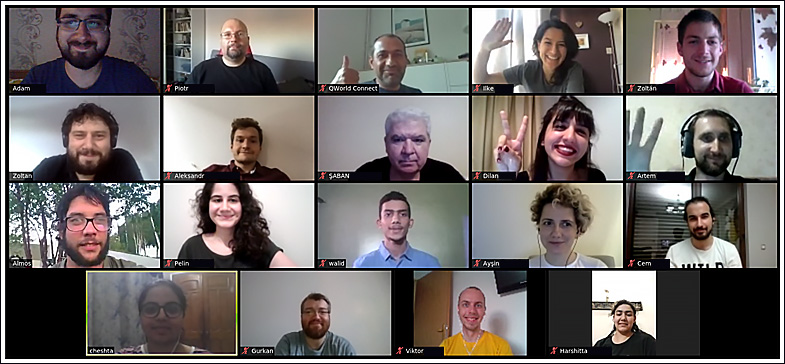
QIntern 2020 was successfully completed!
We are happy to announce that we organized our first QIntern program during July-August 2020! This pilot program of QWorld ran for seven weeks, during which the participants, including students, worked with more experienced researchers and quantum technology enthusiasts.
At the end of the event, the interns from over thirteen projects had the opportunity to present their works. The projects focused on various fields of quantum computer science, including quantum machine learning and quantum optimization. The interns did research on quantum computing with implementation on real devices, developed new educational materials, designed and implemented new software, and did educational research on quantum programming.
At the end of QIntern 2020, the jury evaluated projects as well as presentations of the results and awarded prizes in two categories.
For the best project:
– the first place goes to the projects QFA Implementation and Quantum Byzantine Agreement,
– the second place goes to the projects QML and Edge AI and QML Notebooks,
– the third place goes to the projects Assessing the Effectiveness of Bronze and Solid State QCircuit.
For the best presentation:
– the first place goes to the projects QML and Edge AI and QML Notebooks,
– the second place goes to the projects QFA Implementation and Quantum Byzantine Agreement,
– the third place goes to the project OpenBlochSphere.
Project details
QFA Implementation
Mentors:
Ozlem Salehi (QWorld & Ozyegin University) and Abuzer Yakaryilmaz (QWorld & University of Latvia)
Interns:
Utku Birkan (BS Student in Middle East Technical University), Cem Nurlu (BS Student in Bogazici University), and Viktor Olejar (MS Student in Pavol Jozef Safarik University in Kosice, Faculty of Science)
We worked on implementing two basic quantum finite automaton (QFA) algorithms on currently available quantum computers and analyzing the performance of these machines based on the experiment results. We also used different methods to modify the algorithms in order to get better results against noise and investigated error mitigation techniques to reduce the effects of noise. After the internship, we continued our project under QResearch with the same team, and our project will be completed by May 2021.
Outcomes:
- Poster presentation in QIP2021
- Accepted as a talk in Quantum Computing Thematic Track of ICSS 2021, and it will appear in the proceedings of ICSS 2021.
- We are now working on a final manuscript to cover all results.
Assessing the Effectiveness of Bronze
Mentor:
Zeki Can Seskir (METU Physics Department)
The project aimed at assessing the Bronze workshops through analyzing the pre/post-tests filled by 317 participants at 22 workshops from 10 different countries. We analyzed the results with respect to gender, age, and educational background, and found that Bronze workshops allowed knowledge acquisition for all groups. The project relied heavily on a statistical analysis of collected data, and utilization of concepts from the education literature.
Outcome: a preprint https://arxiv.org/abs/2010.13552
Quantum Networks
Advisor:
Abuzer Yakaryilmaz (QWorld & University of Latvia)
Lead intern:
Krista Pētersone (QLatvia & PhD student at University of Latvia)
Interns:
Vijayasri Iyer (India) and Zeki Seskir (QTurkey & PhD student at METU)
In this project, the team explored different software tools for simulating quantum networks, and they looked closely NetSquid.
OpenBlochSphere project
Mentor:
Abuzer Yakaryilmaz (QWorld & University of Latvia)
Lead intern:
Erdem Yiğit (BS student, Bogazici University, Turkey)
OpenBlochSphere project was initiated to develop a Bloch sphere visualization tool that can be used in QWorld’s education materials. It is mainly based on manim, an animation engine developed to create mathematical animations. What was done throughout QIntern 2020 is limited to developing a graphical user interface (GUI) that makes it easier to apply various quantum gate operations on a Bloch sphere. The project, however, is not complete and there is much room for improvement.
Project repo: https://gitlab.com/qkitchen/openblochsphere
Introductory materials for the new language Silq
Mentor:
Abuzer Yakaryilmaz (QWorld & University of Latvia)
Intern:
Jakub Nowak (QPoland)
The goal of the project was to evaluate Silq language and create introductory materials for it.
Silq introduces some new features to the world of quantum languages that make quantum programming easier. Features like these will be essential in the future to write complex quantum programs. Sadly, while Silq explores these new ideas, it is also very lacking compared to other existing frameworks or languages. Missing features include composite data types, modularity, the ability to split the code into multiple files, visualization, and standard functions. We concluded that the Silq is too experimental to teach it to beginners, yet, we’re eager to see how it will develop in the future.
Coordinators of the QIntern 2020
Adam Glos (QPoland), Berat Yenilen (QTurkey), and Zoltán Zimborás (QHungary).

The QIntern 2020
